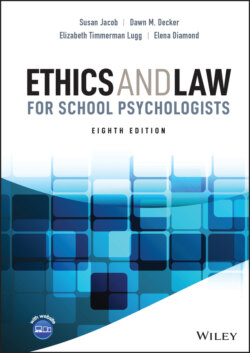Читать книгу Ethics and Law for School Psychologists - Susan Jacob - Страница 38
Responsibility
ОглавлениеAs noted previously, in all areas of service delivery, school psychologists strive to maximize benefit and avoid doing harm. To do so, school psychologists must “use scientific knowledge from psychology and education to help clients and others make informed choices, and accept responsibility for their work” (NASP Broad Theme II). As Lilienfeld et al. (2012, p. 8) observed, all school psychologists, “regardless of the setting in which they operate, need to develop and maintain a skill set that allows them to distinguish evidence-based from non-evidence based practices.” This means consulting scholarly sources (journal articles, reference books, APA and NASP websites) to identify empirically-supported assessment tools and interventions. In addition, in decision-making, practitioners engage in scientific thinking, and are skeptical of, but open to, new tools and techniques. They are advised to learn about and be aware of common cognitive errors such as confirmation bias (the tendency to seek out evidence consistent with our beliefs, and deny, dismiss, or distort evidence that is not), belief perseverance (tendency to cling to beliefs despite repeated contradictory evidence), hindsight bias (error of perceiving events as more predictable after they have occurred), and base rate neglect (neglecting or ignoring the prevalence of a characteristic in a population), among others (from Lilienfeld et al., 2012, p. 15).
Consistent with the idea of responsible caring, school psychologists “accept responsibility for their professional work” (NASP Broad Theme II) and they take steps to offset any harmful consequences of decisions made (APA Principle B; NASP Guiding Principle II.2). More specifically, school psychologists ensure that “the effects of their recommendations and intervention plans are monitored, either personally or by others. They revise a recommendation, or modify or terminate an intervention plan, when data indicate that the desired outcomes are not being attained” (NASP Standard II.2.2).
Under the broad theme of professional competence and responsibility, the NASP’s code of ethics has specific standards for responsible assessment and intervention practices (Guiding Principle II.3 and subsumed standards), school-based record keeping (Guiding Principle II.4 and subsumed standards), and the use of professional materials (Guiding Principle II.5 and subsumed standards).
